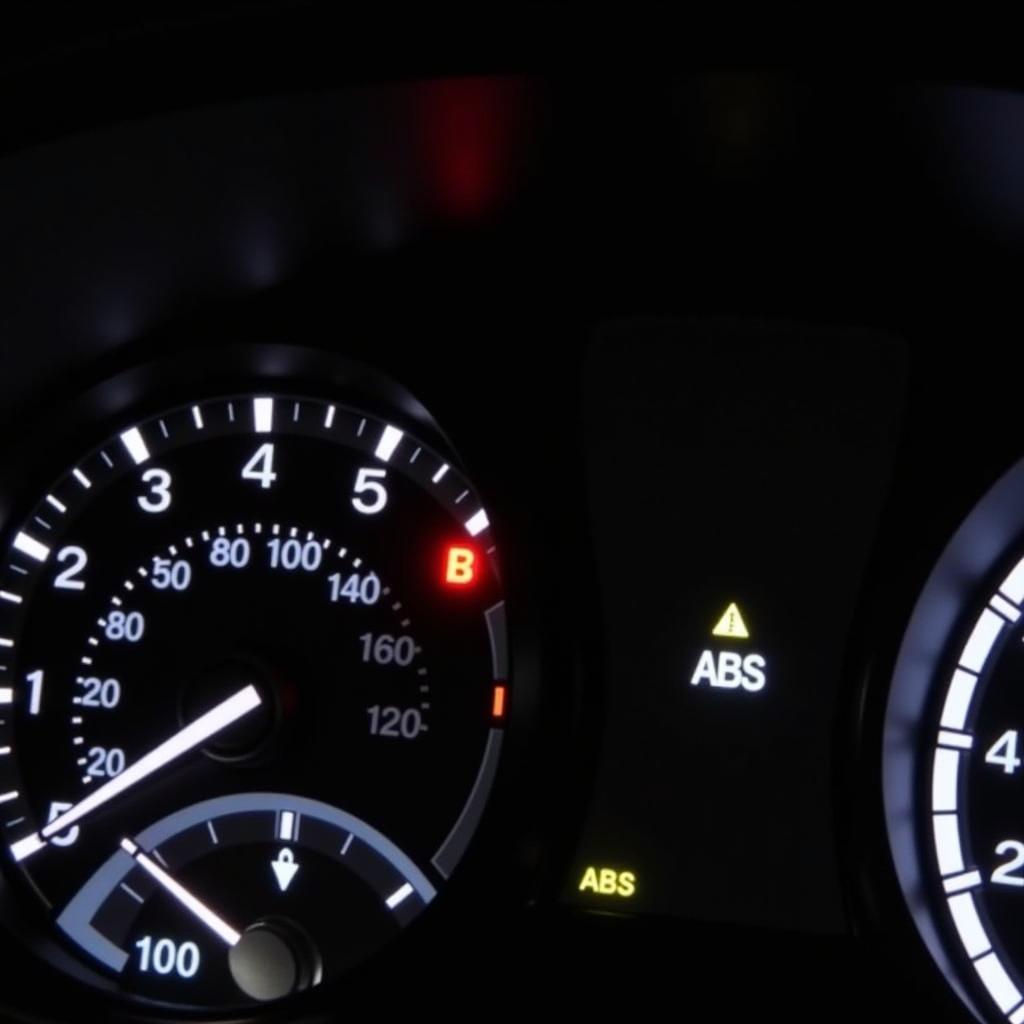The brake warning light on your 2013 Toyota Camry is a crucial safety feature designed to alert you of potential braking system issues. When illuminated, it signals that something requires your attention, from a simple parking brake engagement to more serious problems like low brake fluid or a malfunctioning ABS system. Ignoring this warning could lead to decreased braking performance and potential safety hazards.
Understanding Your Camry’s Brake Warning System
The 2013 Toyota Camry typically uses two main warning lights related to the braking system:
- Red Brake Warning Light: This light illuminates when there’s a problem with the traditional hydraulic braking system. This could indicate low brake fluid, a leak in the system, or an issue with the brake lines, calipers, or wheel cylinders.
- Yellow ABS Warning Light: This light signals an issue with the Anti-lock Braking System (ABS). This could point to a malfunctioning ABS module, a faulty wheel speed sensor, or a problem with the ABS wiring.
 Toyota Camry Brake Warning Lights
Toyota Camry Brake Warning Lights
Common Causes of Brake Warning Lights in a 2013 Camry
Several factors can trigger the brake warning lights in your 2013 Toyota Camry. Here are some of the most common:
- Low Brake Fluid: This is the most frequent culprit. Brake fluid naturally depletes over time, and low fluid levels can significantly reduce braking efficiency.
- Worn Brake Pads: Brake pads have a finite lifespan. As they wear down, the brake fluid level drops. If you haven’t replaced your brake pads in a while, this is a likely cause.
- Brake Fluid Leak: A leak anywhere in the brake system, from the master cylinder to the brake lines, can cause a drop in brake fluid and trigger the warning light.
- Faulty Brake Light Switch: The brake light switch activates your brake lights when you press the pedal. If it malfunctions, it can also illuminate the brake warning light.
- ABS Sensor Issues: A malfunctioning ABS wheel speed sensor can disrupt the ABS system’s functionality, triggering the ABS warning light.
Diagnosing the Problem: What to Do When Your Brake Warning Light Turns On
- Safety First: If your brake warning light illuminates while driving, pull over to a safe location immediately. Driving with compromised brakes is incredibly risky.
- Check the Parking Brake: Ensure your parking brake is fully disengaged. It’s a simple check, but sometimes the culprit is as basic as this.
- Inspect Brake Fluid Level: Carefully open the brake fluid reservoir (refer to your owner’s manual for its location). If the fluid level is below the minimum mark, add the correct type of brake fluid (DOT 3 or DOT 4, as specified in your manual).
- Look for Leaks: Inspect the area around the master cylinder, brake lines, and near the wheels for any signs of fluid leaks.
- Consult a Professional: If you’re uncomfortable performing these checks yourself, or if the brake fluid level is consistently low, it’s crucial to have a qualified mechanic diagnose the problem.
“Ignoring a brake warning light is like ignoring a flashing ‘check engine’ light on an airplane,” warns John Smith, a certified automotive technician with over 20 years of experience. “It might seem fine for a while, but eventually, it could lead to a disastrous outcome.”
Remote Diagnostics and Software Solutions: The Future of Car Repair
Advancements in automotive technology now allow for remote diagnostics and software solutions for certain car problems. This means technicians can potentially diagnose and even fix some issues with your 2013 Camry’s braking system remotely, using specialized software and your car’s onboard computer.
While this technology is still evolving, it offers a glimpse into the future of car repair, providing more convenience and efficiency for car owners.
Conclusion
The brake warning lights in your 2013 Toyota Camry are vital safety indicators that should never be ignored. While some causes, such as low brake fluid, might be simple to address, others require professional expertise. Regular maintenance and prompt attention to warning signs will keep your Camry’s braking system in top condition, ensuring your safety on the road. Don’t hesitate to consult a qualified mechanic if you have any concerns about your Camry’s brakes.
